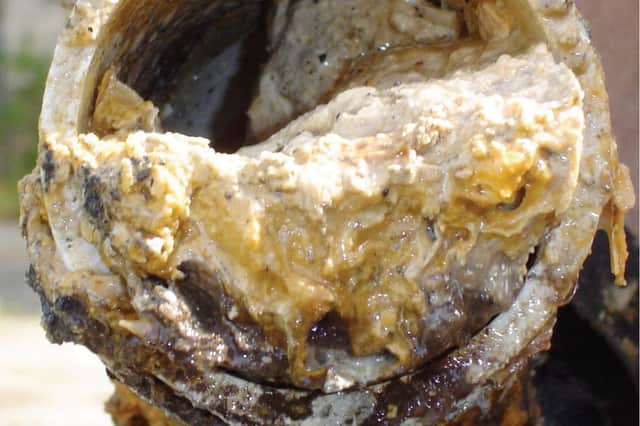Northumbrian Water issues appeal to avoid Christmas dinner blockages.


Christmas is a time of year when sewers are at high risk of being blocked as a result of people pouring fats, oils and grease (FOG) down the sink.
As these cool, they solidify, causing and contributing to blockages in the sewer as they mix with other things that shouldn’t be in there, such as wet wipes.
Advertisement
Hide AdAdvertisement
Hide AdIn turn, those blockages can result in waste that has been flushed down the toilet being forced back into homes or out into the environment.
Northumbrian Water is asking people to follow one simple rule: Never pour fats, oils and grease down the sink.
Instead, people should leave FOG to cool before scraping it into the bin.
Alison Wilson, wastewater performance manager at Northumbrian Water, said: “Christmas is a time of year where we all want to take the time to relax and enjoy being around the people we love. The last thing we want is for that to be disrupted by a sewer blockage affecting our homes, or even waste being forced back into our properties.
Advertisement
Hide AdAdvertisement
Hide Ad“But there is a heightened risk of this happening when people pour their fats, oils and grease from cooking down the sink. The fat from a turkey can be enough to fill a Christmas pudding bowl. Some of the pipes closest to homes are only about four inches wide, so when that fat cools and hardens, it can be a real problem.
“The answer is really simple. Let the fat, oil and grease cool, then scrape it into the bin.”
Northumbrian Water is also reminding people to not flush wipes.
Alison said: “At Christmas, we often have different people visiting or staying with us, or spend more time than normal visiting friends and family. Please be kind and, if you do need to use wipes for any reason while visiting someone, make sure you don’t use their toilet as a bin. A blockage is the last thing you want to give a loved one for Christmas. Please, Bin The Wipe!”
The company launched its Bin The Wipe campaign in January 2020, after wipes were found in 64% of the blockages its team cleaned from sewers around the North East in 2019.